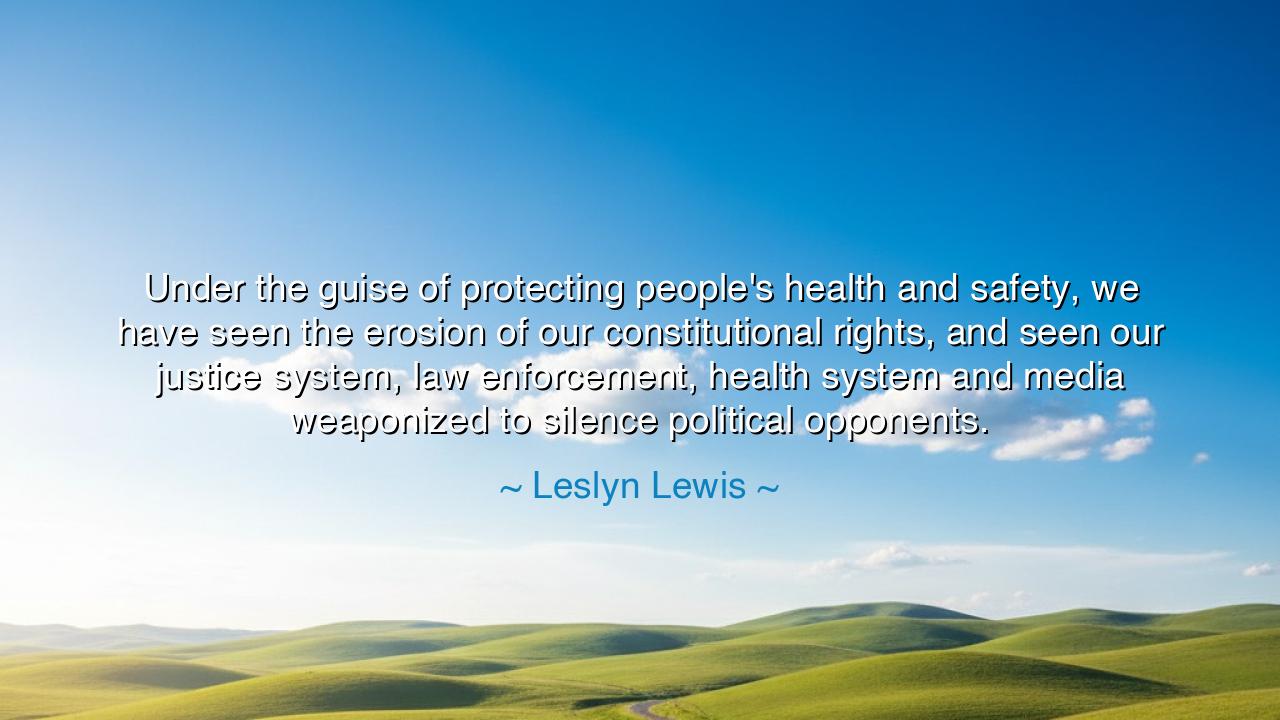
Under the guise of protecting people's health and safety, we have
Under the guise of protecting people's health and safety, we have seen the erosion of our constitutional rights, and seen our justice system, law enforcement, health system and media weaponized to silence political opponents.






The words of Leslyn Lewis — “Under the guise of protecting people's health and safety, we have seen the erosion of our constitutional rights, and seen our justice system, law enforcement, health system and media weaponized to silence political opponents.” — strike with the solemn gravity of a warning bell. They are not spoken from anger alone, but from the ancient fear that freedom, once surrendered, is not easily reclaimed. Beneath her lament lies a truth older than any nation: that power cloaked in virtue can become the most dangerous power of all, for tyranny often enters not by force, but by the whisper of protection.
From the beginning of human governance, rulers have justified control through the language of safety. The Roman emperors claimed they silenced dissent for the “peace of the empire.” Monarchs of Europe justified censorship in the name of “order and stability.” And in every age, those who questioned authority were branded as enemies of the common good. Lewis’s words echo this eternal pattern — the cycle by which fear is used as a tool to erode liberty, and by which the guardians of justice can become its betrayers when vigilance sleeps.
The origin of her warning can be traced to recent times, when governments around the world — confronted by crisis, disease, and unrest — expanded their powers in the name of health and safety. In moments of fear, the people, weary and anxious, often accept restrictions once unthinkable. Yet history teaches that every chain, however light at first, grows heavier with time. The philosopher Tacitus once wrote that “the more corrupt the state, the more it legislates,” reminding us that laws meant to protect can just as easily be wielded to control. Lewis’s cry is therefore not against protection itself, but against the corruption of its purpose.
There is a lesson in the tale of Socrates, the wisest of Athens, who was condemned to death by those who claimed to defend morality and civic harmony. They said his questioning endangered the youth, that his teachings undermined virtue — and so, for the safety of the city, he was silenced. Yet centuries later, the name of Socrates endures, while his accusers are forgotten. So it is with every age: when justice becomes the weapon of politics, truth becomes its first casualty. Lewis warns that when institutions built to protect liberty are turned against dissent, the spirit of democracy itself is poisoned.
Her words also shine a light on the frailty of the human mind under fear. For when people are afraid — of illness, of instability, of one another — they seek refuge in authority. But as the ancients knew, fear is a poor counselor. It makes men trade their freedom for the illusion of safety, and their voices for the comfort of conformity. The historian Livy once described the fall of the Roman Republic not as a single coup, but as “a thousand small surrenders” — each made in the name of protection, each eroding the foundation of liberty. So too, Lewis speaks to our age, where those who question are often branded dangerous, and where truth itself becomes a battlefield.
Yet there is hope, for awareness is the beginning of restoration. When citizens remember that freedom is not a gift from rulers but a birthright, they awaken from slumber. When they hold power accountable, demand transparency, and guard speech as the mother of all liberties, the tide begins to turn. Lewis’s call, then, is not merely protest but prophecy — a reminder that every generation must choose: to live as free people, or as subjects of benevolent control.
Therefore, my children of the modern world, learn this sacred lesson: do not surrender your voice, even when silence feels safe. Question those who govern you, even when their cause seems noble. Defend the right of others to speak, even when you disagree. For the moment a people cease to question in the name of comfort, they are already half enslaved.
Let these words endure as both warning and wisdom: that liberty, once lost, seldom returns without struggle. Guard it not with anger, but with courage and clarity. For when truth walks hand in hand with freedom, the nation thrives; but when either is shackled, the soul of the people fades into shadow. To protect health is noble — but to protect freedom is sacred.






AAdministratorAdministrator
Welcome, honored guests. Please leave a comment, we will respond soon